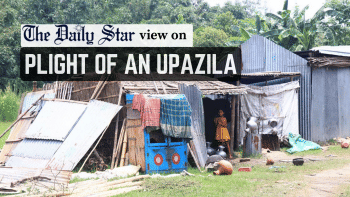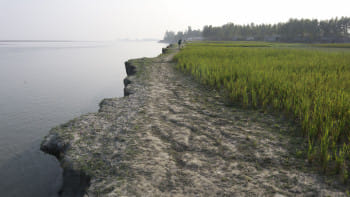Where will the erosion victims go?

Every year, thousands of people across the country fall victim to river erosion, leading to displacement from their ancestral land as well as separation from their loved ones. But government efforts to help them with shelter and livelihood opportunities have often been inadequate. This daily has published a number of reports in recent months detailing the miserable conditions in which these families are being forced to live. While many end up migrating to other places, those who remain—particularly the elderly population—struggle to manage shelter or even three meals a day.
In Lalmonirhat, according to a recent report, erosion of Teesta and Dharla riverbanks has affected at least 12,500 families over the last decade, devouring over 9,000 acres of arable land. There are 20-22 points in Teesta and Dharla shoal where erosion takes place every year, yet hardly any measure has been taken to prevent it or address the vulnerability of local communities. Another issue that deserves scrutiny is the plight of erosion victims. Reportedly, during the 10-year period, Tk 200 crore has been spent to monitor and prevent erosion in the district. If that was the case, why does it continue to devastate communities? Why do victims still need to live on abandoned railway lines, dykes or roads?
The situation is the same in other districts where river erosion has been a common phenomenon. For instance, around 70 percent of the land of one upazila in Sirajganj has been lost to the Jamuna over the past 20 years, leaving around 50,000 people from 50 villages homeless. We wonder how these people will bounce back without proper support.
It's really saddening that people who once had their own homes and lived a normal life are now having to live the life of refugees in their own country. We urge the government to take appropriate measures to address this situation, including by properly utilising climate funds to build resilience among vulnerable communities, addressing the Teesta crisis through bilateral negotiations, and better supporting erosion-affected families. Otherwise, these people will continue to suffer.


 For all latest news, follow The Daily Star's Google News channel.
For all latest news, follow The Daily Star's Google News channel. 









Comments